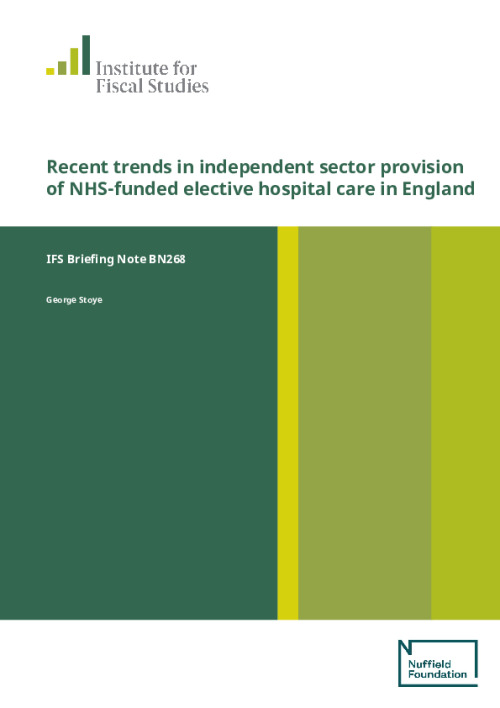Ahead of the upcoming General Election, there has again been extensive discussion about the role that the private sector plays within the National Health Service (NHS). Labour has vowed to ‘end and reverse privatisation in the NHS in the next parliament’, signalling an ambition to end – or at least significantly reduce – the role played by private providers in treating NHS-funded patients.[1]
This briefing note sets out recent trends in the provision of NHS-funded hospital care by private providers – commonly referred to as independent sector providers (ISPs) – in England. We show that ISPs play a small but growing role in providing pre-planned care to NHS patients, and that this role is much larger for some procedures and in some regions. Policy to reduce this role would require careful planning and a meaningful increase in NHS hospital capacity to prevent falls in some areas of NHS activity.
Key findings
- In 2018–19, the NHS purchased £14.0 billion (2019–20 prices) of care from non-NHS providers. This accounted for 11% of the Department of Health and Social Care day-to-day expenditure. Two-thirds of this spending (£9.4 billion) was to purchase a variety of care for NHS patients from ISPs.
- ISPs account for a small, but growing, share of NHS inpatient activity. They provided 609,549 NHS-funded elective episodes in 2017–18 (6% of all NHS elective activity) compared with almost none in the mid-2000s.
- Wider NHS activity has increased substantially over the last 15 years, with ISPs accounting for one-sixth of this growth. The total number of NHS-funded elective episodes grew by 3.8 million (59%) between 2003–04 and 2017–18, 16% of which were conducted by ISPs.
- The NHS is becoming increasingly reliant upon ISPs for some types of elective work. For example, in 2017–18, ISPs conducted 30% of all NHS-funded hip replacements, 27% of inguinal hernia repairs and 20% of cataract procedures. Replacing this capacity within NHS providers would therefore require careful planning.
- In some cases, ISPs have provided additional capacity for the NHS, while in others they appear to have been used as an alternative provider of care. 82% of the growth in hip replacements between 2003–04 and 2018–19 was accounted for by ISPs. ISPs carried out 13,478 additional hernia repairs over the period, while NHS volumes fell by 18,267, representing a large shift in activity in this area away from NHS hospitals and towards ISPs instead.
- There are large geographical differences in the use of ISPs across England. ISPs conducted over 40% of NHS-funded hip replacements in the East Midlands and the South East. This compares to only 11% in London.
[1] See the Labour Party’s 2019 election manifesto, https://labour.org.uk/wp-content/uploads/2019/11/Real-Change-Labour-Manifesto-2019.pdf.









